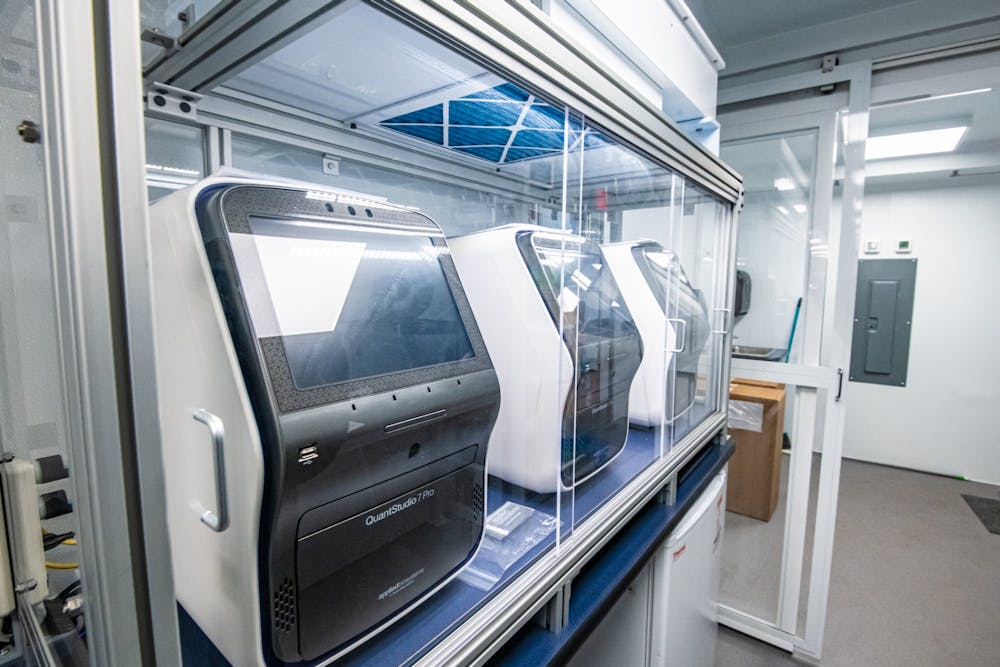Update: This story has been updated throughout, including with information from a March 5 email.
AU’s 24-hour coronavirus testing procedure will be usable by students starting Monday and by faculty and staff on March 15, Vice President of Campus Life and Inclusive Excellence Fanta Aw announced in an email to the University community Friday.
Those getting tested are required to bring their phones to the site, where they will log into the free Safer Community app to begin the process. AU asks that everyone download the app before going to get tested, as it will be used both to check into the site and to disseminate results.
“We will appreciate your patience and understanding as we transition to this new system that will help keep our community safe,” Aw wrote.
The location of tests is staying the same, however: Constitution Hall for students and the University Club for faculty and staff. The test is still a saliva-based PCR test, which means that those getting tested should not eat, drink, chew, smoke, vape, or drink water for an hour before testing, Aw wrote.
---
American University will utilize a new COVID-19 testing program that returns results for saliva-based polymerase chain reaction tests in 12-to-24 hours beginning March 1, AU’s media relations department announced Wednesday.
The University is collaborating with The Catholic University of America, Gallaudet University, Marymount University and Baltimore City Public Schools to bring a mobile testing lab to D.C. that will be hosted on Gallaudet’s campus. Vice President of Campus Life and Inclusive Excellence Fanta Aw said that the new program comes at a crucial time for the University as it prepares to welcome over 500 students to campus in early March for the Mid-Semester Residential Experience and works to expand testing capacity in preparation for the fall semester.
“Robust COVID-19 testing is essential to the health and safety of the American University community and the entire D.C. region,” said AU president Sylvia Burwell in Wednesday’s press release. “Bringing together universities, K-12 schools, and community organizations to provide testing will increase knowledge about the virus, help prevent further community spread, and advance in-person activity.”
Currently, AU COVID-19 tests can take up to 3 days to return results since the University ships its tests to New Jersey and New York.
Caleb Farris, a freshman on the AU swim team, said he is excited about the possibilities of improved testing. A test he took on Feb. 15 didn’t come back until Feb. 18, preventing him from participating in swim practice for the entire week.
“I had to take the week before that off too because of the athletic department shutdown,” Farris said. “Since move in, I’ve practiced like six times because of all the COVID delays.”
Aw said she expects the number of tests AU processes in a week to rise from its current average of 1,700 to 2,500 tests a week. The lab has the capacity to process up to 50,000 tests each week.
Faster testing capacity will also allow AU to accelerate its affiliate notification program, an initiative launched this spring that notifies members of the AU community if they’ve recently been exposed to the virus by another AU individual.
“Through the IT department, we have been able to have direct integration, so whenever there is a positive test reported from the lab, a case is automatically opened for them,” said Leanne Wright, the director of the program.
Wright added that AU’s contact tracing team works seven days a week during business hours, which means that most cases will be taken care of on the same day.
According to Aw, the new testing program and infrastructure is being provided by SHIELD T3, an organization created by the University of Illinois to market its COVID-19 tests. AU is funding the testing lab.
On March 1, the test was approved for emergency use by the Food and Drug Administration. The Department of Health and Human Services recently changed its guidelines for laboratory-developed tests, which no longer require FDA approval as long as the test is processed in a lab certified by the Clinical Laboratory Improvement Amendments.
The program will include an app modeled after the University of Illinois’ Safer Illinois app, which students must download to track their test results. The app has not been named by the University yet. Aw said that the only foreseeable delay to the program’s rollout would come from development issues with the app.
The University will pay $32 per new test, a significant price drop from the $120 AU currently spends on each test, Aw said. The price for tests will incrementally drop to $25 if more universities from the Consortium of Universities of the Washington Metropolitan Area join the program.
Tests will continue to be self-administered and saliva-based. Aw acknowledged that there will likely be a learning curve for the tests as students can’t eat or drink anything an hour prior. She added that the test can sometimes come back inconclusive for heavy smokers.
Despite the University’s advances in COVID-19 testing infrastructure, Aw stressed that testing is just one important component of creating a safe and healthy environment on campus.
“One of the things I have to remind people, the test is a snapshot of a moment, right,” Aw said. “The behaviors we’re talking about, which have to do with masking and physical distancing and washing your hands, has to become the norm for now.”
This is a developing story and will be updated as more information becomes available. Dan Papscun contributed reporting to this article.





